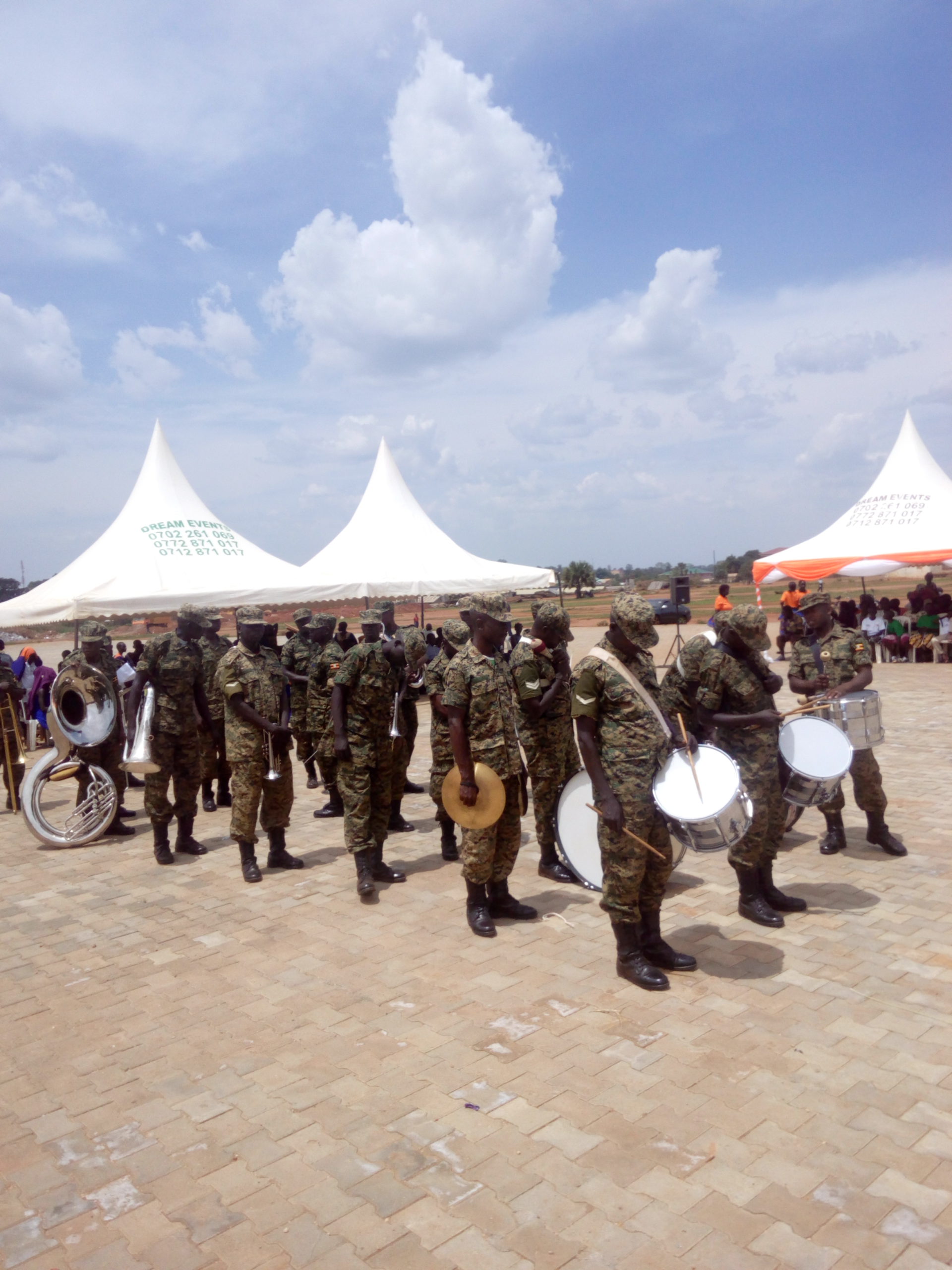UPDF Brass band in action, during a public function. This is how Uganda keeps its troops busy throughout the year.
“Soldiers pay up to one million shillings in order to be deployed in Somalia on a one-year contract. But for us in units, it is better because if they want to deploy a particular unit, all soldiers in that unit are deployed without any bribe to the officers at the Chief of Personnel and Administration (CPA) office”
GULU, UGANDA–Two weeks ago, I had a very rare opportunity to hold a one-on-one interview with a Uganda Peoples’ Defense Forces (UPDF) soldier who has so far served in three foreign military missions: against the Lord’s Resistance Army (LRA) rebels in South Sudan and Central African Republic; and, against Al-Shaabab in Somalia.
Lance-Corporal Kumbuka (not his real name to protect his safety) who is 30 and serving in the UPDF, says most soldiers who are not in basic units like his Battalion bribe senior officers in order to be deployed in lucrative but deadly operations such as the Somalia mission. He says the minimum these senior officers charge is one million Uganda shillings (less than $300 US dollars) for every soldier not in regular units. Uganda’s estimated annual income per head is $700. “Soldiers pay up to one million shillings in order to be deployed in Somalia on a one-year contract. But for us in units, it is better because if they want to deploy a particular unit, all soldiers in that unit are deployed without any bribe to the officer at the chief of personnel and administration office”, or CPA, says Kumbuka.
A UPDF soldier at the lowest rank of private earns less than $100 dollars, or shs. 310, 000.00, per month but the soldier who gets deployed in Somalia gets a net allowance of 17 million Uganda shillings, about $4,280 dollars, for the one year contract plus additional per diem of $100 per month. So whereas a non-foreign operations deployed soldier makes less than $1,200 annually, the one who goes to danger zones in Somalia can make up to $5,480.
According to Mr. Kumbuka, CPA office in Kampala has paid him only $300 for three months’ per diem instead of the $1,200 for the service he rendered in 2015 in Somalia; he is still claiming a total balance of $900.
Kumbuka says although the leadership still owes him $900, he has managed to buy a piece of land in the village where he built a four-roomed house for his family and continues paying fees for his children and siblings with the little he received for his service in war-torn Somalia.
“Without the deployment in Somali, I wouldn’t have been able to buy land, build a four roomed house and still be able to pay fees for my children and other siblings. Government should consider increasing soldiers’ salaries to a minimum of shillings 500,000″, he sayd, which is about $150.
He revealed that soldiers who served in South Sudan, Democratic Republic of Congo (DRC) and in Central African Republic (CAR), to hunt for the elusive LRA leader Joseph Kony and his top commanders, don’t get the kind of pay those deployed in Somalia get.
The New York Times reported that the United States has spent $780 million, which is about shs. 280,176,000,000 (over shs 280 billion) in the search for Kony. The U.S. gazetted the LRA as a terrorist organization. Because of such assistance, Uganda has been able to deploy its troops outside the country to countries such as DRC, South Sudan and CAR in its effort to get Kony.
Troops deployed here do not get benefits of being deployed outside Uganda as their counterparts serving in Somalia against Al-Shaabab. Kumbuka says he supports the position of the new American President, Donald Trump, on withdrawal of support to hunt down the LRA in CAR. “It is good for us if we were withdrawn from CAR. It will enable us rest a bit. We shall wait for them from within our country”, says Kumbuka, referring to the LRA.
A day in the life of a Ugandan soldier in Somalia Mission: A Ugandan soldier serving in Somalia begins his or her daily routine at 5.00 am local time with foot patrols around the defense up to 7.00 am local time where soldiers move in groups of 20-30 soldiers. After 7.00 am they return to the defense to wait for situation reports, “sitreps” from informants and reports of any bomb scare for follow up. Lunch is served at 1.00 pm.
Another important role of such soldier is to go and receive and escort convoys of friendly forces to enable them to reach safely to their bases; otherwise they just sit around the defense doing nothing in particular.






